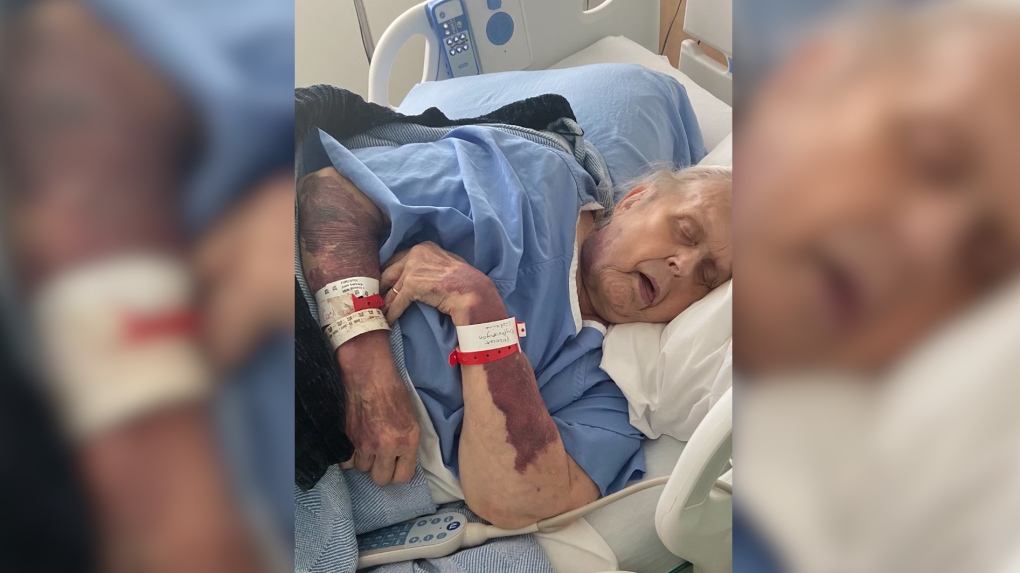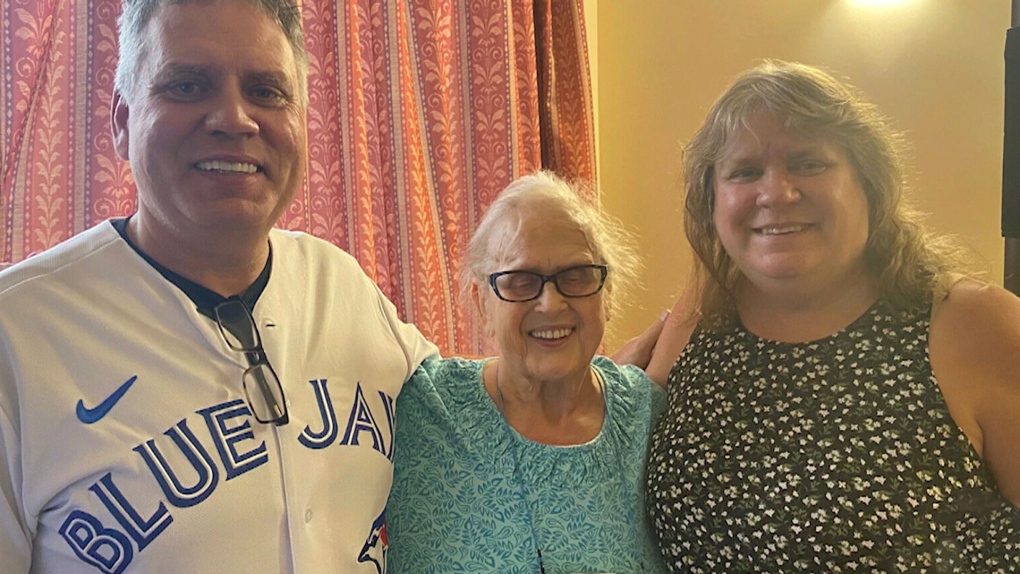'I couldn't believe anyone would do that': Hospital security guard at Toronto hospital puts senior in headlock, family says
An Ontario family is calling for systemic change after an 84-year-old woman went to a Toronto hospital emergency room, waited overnight and ended up injured after they say a hospital security guard put her in a headlock.
Photos taken by her family and provided to CTV News Toronto shows June Turcotte’s face and arms badly bruised after a visit to investigate low blood sugar at Michael Garron Hospital turned into a nightmare ordeal they don’t believe anyone should go through.
“I went to my car and cried. I was sobbing. I couldn’t believe anyone would do that to a little old lady,” said Turcotte’s daughter, Shelley Pett. “She was no threat to anybody.”
Pett said Turcotte, who lives in a long-term care home, is deaf and has dementia. Pett took Turcotte to Michael Garron Hospital around noon on Sept. 19 to investigate low blood sugar levels that the care home had identified.
- Download our app to get local alerts on your device
- Get the latest local updates right to your inbox
She was still there by nightfall, and when Pett decided to go home and sleep, she says she told hospital staff to call her if there was any trouble communicating with or calming Turcotte, who usually reads lips but may not have been able to do that in the hospital with medical staff wearing masks.
Pett also left her with a white board that anyone could write words on to communicate as well, and said she didn’t mind rushing back to the East end Toronto hospital to solve any issues that came up.
She said she got no phone call, but when she returned the following morning she found Turcotte being watched by a hospital staffer who told her Turcotte became agitated and had to be restrained.
“She pulled the blanket down and I noticed there wasn’t a spot on either of her arms that wasn’t covered in bruises,” she said.
 June Turcotte’s face and arms badly bruised after a visit to investigate low blood sugar at Michael Garron Hospital.
June Turcotte’s face and arms badly bruised after a visit to investigate low blood sugar at Michael Garron Hospital.
What followed was a months-long effort to get answers out of the hospital about what happened and why. The hospital provided Turcotte’s medical records and met with Pett and her brother Michael Turcotte.
They said the hospital told them Turcotte was given loud verbal commands that she didn’t respond to, and that records showed staff tried to contact the family, though neither Pett nor her brother have any record of that.
Medical records show that after the injury, Turcotte was taken for a CT scan and X-rays. For the reasons why those tests were ordered, staff wrote “confusion” and “pain” rather than mentioning the injuries themselves.
“She didn’t have pain and bruising before she went in the hospital,” Pett said.
Michael Turcotte said there is a video of the incident but it hasn’t been shared with them – and questions why force was used on his mother at all.
“It just seems to me that nothing was done to de-escalate. They immediately placed hands upon her, a frail woman with osteoporosis. It didn’t seem to me they tried any other methods,” he said.
A Michael Garron Hospital spokesperson told CTV News Toronto in a statement that they can't talk about the specific incident to protect the patient’s privacy.
“Depending on the nature of the situation, it is not uncommon for hospitals to work with law enforcement alongside patients, families and their care team as a supplementary measure,” said the statement, on behalf of Kevin Edmonson, the vice-president of clinical programs and quality.
“We provide training to staff and clinicians who care for elderly patients to ensure those with complex needs receive safe, timely and compassionate care. This includes de-escalation techniques, non-violent crisis intervention, and gentle persuasive approaches, an evidence-based training program that helps care providers respond respectfully to behaviours associated with dementia,” the statement said.
Leaked data from Ontario Health showed that one in 10 patients admitted to a hospital from an emergency department waits at least two days before they get to a bed in November 2023.
Toronto emergency room physician Raghu Venugopal said the longer a patient remains in an emergency room, the more unpredictable their complications can become, and he said that month is among the worst months for that metric in recorded history in Ontario.
“Elderly people, perhaps for a minor problem or a couple of problems, come in, and their regular medications aren’t prescribed. They’re not helped to the toilet because the nurses and staff are run off their feet. The lights are going constantly. The sound is going constantly. There’s very few people to remind them of where they are and why they’re there. That confusion on top of a little bit of dementia leads to delirium,” he said.

“Many of our citizens in our province are admitted to the hospital, but there is no bed to admit them to. And so they linger in a hallway. And really, the sad thing is that what you see is hallways with orange blankets on stretchers with silver and gray hair, row upon row in the hallways,” he said.
He said there is increasing use of security guards in hospitals – sometimes three or four times in one of his shifts – but he said he had not personally witnessed a security guard harming a patient.
At a news conference Wednesday, when asked about the case, Ontario Health Minister Sylvia Jones defended the health care system.
“We have made a number of investments with our hospital partners to make sure we have the resources they need,” she said.
“We have emergency departments and clinicians working in very challenging circumstances,” she said.
Jessica Harper of the Alzheimer Society of Manitoba said in an interview that managing patients with dementia can be a nuanced task. She said in handling someone with dementia who may be distressed, it can be important to “enter their world” and troubleshoot what they may be missing even if they can’t properly explain it themselves.
“In places like a hospital that are not often dementia-friendly environments, coupled with a lack of understanding about dementia and what the disease is, it’s really setting almost everyone up for a potentially unsuccessful outcome,” she said.
The rate of harmful events in Canadian hospitals is trending up, from 5.3 per 100 visits in 2014-2015 to 6.0 per 100 visits, according to the Canadian Institute for Health Information.
Michael Turcotte said he is hoping to hear from Michael Garron Hospital that they are investing in services for people with dementia, and also invest in sign language interpreters that could have helped communicate.
His family has also filed a police report. When contacted by CTV News Toronto, the Toronto Police Service said in a statement their investigation remains “very active.”
“Something needs to change because it’s not working,” Michael Turcotte said.
CTVNews.ca Top Stories

Nearly 46,000 electric vehicles recalled in Canada over potential power loss
Nearly 46,000 electric vehicles from Kia, Hyundai and Genesis are being recalled in Canada over a potential power loss issue that can increase the risk of a crash.
Canada Post quarterly loss tops $300M as strike hits second week -- and rivals step in
Canada Post saw hundreds of millions of dollars drain out of its coffers last quarter, due largely to its dwindling share of the parcels market, while an ongoing strike continues to batter its bottom line.
'Immoral depravity': Two men convicted in case of frozen migrant family in Manitoba
A jury has found two men guilty on human smuggling charges in a case where a family from India froze to death in Manitoba while trying to walk across the Canada-U.S. border.
Canada's tax relief plan: Who gets a cheque?
The Canadian government has unveiled its plans for a sweeping GST/HST pause on select items during the holiday period. The day after the announcement, questions remain on how the whole thing will work.
Quebec man, 81, gets prison sentence after admitting to killing wife with Alzheimer's disease
An 81-year-old Quebec man has been sentenced to prison after admitting to killing his wife with Alzheimer's disease.
Pat King found guilty of mischief for role in 'Freedom Convoy'
Pat King, one of the most prominent figures of the 2022 'Freedom Convoy' in Ottawa, has been found guilty on five counts including mischief and disobeying a court order.
Trump supporters review-bomb B.C. floral shop by accident
A small business owner from B.C.’s Fraser Valley is speaking out after being review-bombed by confused supporters of U.S. president-elect Donald Trump this week.
Grey Cup streaker fined $10K, banned from BC Place
The woman who ran across the field wearing nothing but her shoes at last weekend’s Grey Cup has been given a fine and banned from BC Place.
Ground beef tied to U.S. E. coli recall, illnesses wasn't sold in Canada: distributor
At least 19 people in Minnesota have been sickened by E. coli poisoning tied to a national recall of more than 167,000 pounds of potentially tainted ground beef, federal health officials said.


































